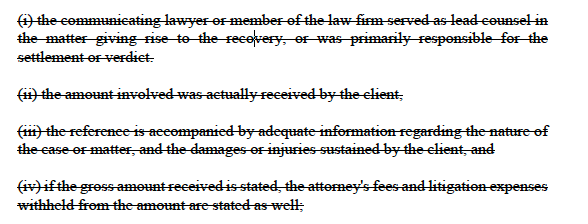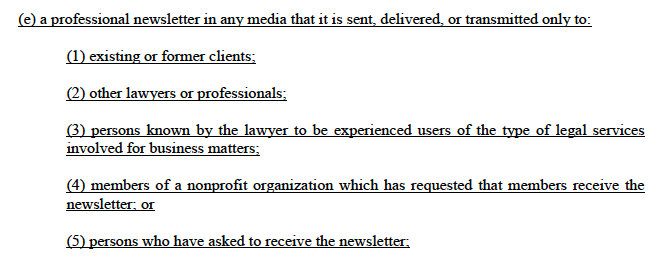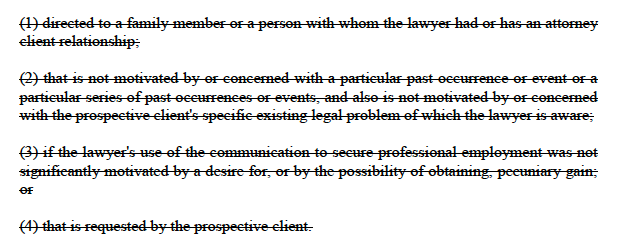I took a Professional Responsibility course in law school, but I can’t remember the grade I received. I think it was at least a B, so hey, that’s good enough for a thought leader, right?
Anyway, major changes to the ethics rules that govern Texas lawyer advertising—including the use of social media—may be coming soon. (Narrator: the Texas Supreme Court approved the changes in a May 15, 2021 order you can download here.)
The proposed changes would modernize and improve the advertising rules. If the changes are enacted, Texas law firms will be allowed to use trade names, and Texas lawyers will be able to use social media more freely without fear of stepping on ethical landmines.
The proposed changes would amend Part VII of the Texas Disciplinary Rules of Professional Conduct, which contains Rules 7.01-7.07 governing lawyer advertising and solicitation. These rules are, frankly, kind of a mess. They were obviously written to regulate plaintiff’s personal injury lawyers, and they are awkward to apply to other practice areas.
For example, how is a defense lawyer or a transactional lawyer supposed to comply with the requirement that when stating results obtained, “the amount involved was actually received by the client”? See Rule 7.02(a)(2)(ii). This is just one example. And these were problems before social media.
Applying these rules to social media is even more awkward. I’ve written about this problem before. See Five Rules Texas Lawyers and Other Professionals Must Follow When Using Social Media. As I explained, the good news was that the Texas State Bar Advertising Review Committee helped by issuing Interpretive Comments that clarified application of the rules to social media.
The bad news was that the Interpretive Comments still left open the possibility that (a) all the Texas lawyers who have LinkedIn profiles they haven’t filed with the State Bar are technically violating the requirement to file all lawyer advertising, and (b) every time a Texas lawyer posts something on social media, it could be an “advertisement in the public media” that is supposed to be filed.
For these reasons, when the Committee on Disciplinary Rules and Referenda circulated proposed changes to the advertising rules earlier this year, I recommended some changes to clarify these issues. See Influential Blogger Recommends Tweaking New Texas Ethics Rules.
To their credit—and to my pleasant surprise—the Committee members took the time to review my detailed memo, expressed appreciation, and listened attentively to my comments at the public hearing. They even invited me to share additional comments at a subsequent meeting and made further changes to the proposed rules to address some of the issues I raised. That was pretty cool.
As a result, the proposed rules include an exemption from the filing requirement for social media posts that are primarily “informational” or “educational,” as well as an exemption that would cover most lawyer social media profiles.
These are significant improvements that will encourage use of social media by Texas lawyers, while continuing the general prohibition of false or misleading lawyer advertising.
Want to see the details? Check out the submission packet for the proposed changes, including a redlined version of the rules. The packet even includes my memo and a transcript of my public comments. For the 15 changes that seem most important to me, read on.
Proposed Structural Changes
I call the first five changes structural in nature. These are the kind of changes that lawyer ethics nerds will love.
#1: One general “false and misleading” rule would replace the previous “per se” rules
This first one requires a little explanation, so bear with me.
The prohibition of false or misleading statements has been moved from Rule 7.02 to Rule 7.01, but the definition of “false or misleading” is the same:
The new part is an expanded definition of a “misleading” statement:
The key terms here are “substantial likelihood,” “reasonable person,” and “unjustified expectations.” This is more specific than the previous prohibition, which has been deleted:
The idea is to prohibit statements that, while literally true, would cause a reasonable person to expect too much. The classic example would be something like “we got a $5 million verdict for a trucking accident victim, and we can do the same for you!”
This is a good clarification, but I don’t view this as a material change.
The bigger change is that the rules now rely on the general prohibition of false and misleading statements, without also enumerating specific types of false and misleading statements.
Previously, the rules identified certain statements that were false and misleading per se, particularly as to past results. Now the per se rule about past results would be deleted:
This is a welcome change. This awkward rule created ambiguity because there are so many situations where it just doesn’t apply. The Advertising Review Committee had to clarify with Interpretive Comment 26, which essentially said just comply with the parts of the rule that apply to your situation:
With the deletion of the previous per se rule about results obtained, this interpretive comment would no longer be necessary. The only downside is that I would no longer get to gripe about this rule when I present this topic at CLE seminars.
#2: The rules would now have a definition of “advertisement,” with the key language “offers or promotes legal services”
The new Rule 7.01 “governs all communications about a lawyer’s services, including advertisements and solicitation communications.” Believe it or not, the old rules did not define an “advertisement” in the public media, but the new Rule 7.01 would:
The definition has three key elements:
(1) “substantially motivated by pecuniary gain”
(2) made to “members of the public in general”
(3) “offers or promotes legal services”
In my memo to the Committee, I quibbled with the “pecuniary gain” element because it’s subjective. Plus, isn’t most of what lawyers post on social media motivated by “pecuniary gain” to some degree? But it’s probably not a big deal. The “substantially motivated” language should be sufficient to keep this from being a problem.
The two other elements are really the key. To trigger the advertising requirements, it has to be a communication to the public, so a private post viewable only by your 50 Facebook friends is probably not advertising. And it has to offer or promote legal services. So a tweet that says “I’m working this weekend on a brief for a client” won’t be considered an advertisement.
Why does this matter? For one thing, the rules generally require advertisements to be filed with the Advertising Review Committee. More about that later.
#3: The rules would now have a definition of “solicitation,” which includes “offering to provide legal services”
The proposed rules also have a new definition of a “solicitation communication”:
This definition has three elements, which correspond to the three elements in the definition of advertisement we looked at earlier:
(1) “substantially motivated by pecuniary gain”
(2) made to a “specific person who has not sought the lawyer’s advice or services”
(3) “offering to provide legal services . . . in a particular matter”
Thus, the difference between an advertisement and a solicitation communication is that a solicitation communication is to a specific person about a particular matter. This can be important because there are specific rules about solicitation in Rule 7.03, including a prohibition on solicitation through social media (with some exceptions).
#4: The rules would now expressly refer to social media
Speaking of social media, the proposed rules would include “social media” in the communications regulated by the rule on solicitation:
Nobody thinks the existing rules don’t apply to social media, but expressly acknowledging social media in the advertising rules is a welcome update. I only wonder if, 20 years from now, the phrase “social media” will be out of date and people will cringe when they read it.
#5: There would be no separate rule for law firm websites
The current rules have a special provision just for law firm websites in Rule 7.07(c). That provision is old enough that it had to include a definition of “website.” The upshot of that rule is that law firms can file the homepage but not worry about filing changes to the rest of the website.
The new rules would have the same effect, but they would do it by adding a filing exemption for portions of the website other than the homepage. (I address this exemption below.)
Those are the major structural changes I see in the proposed new rules. The next five changes are new exemptions to the filing requirement. These exemptions would have more of a practical impact.
Proposed Exemptions from the Filing Requirement
Unless an exception or exemption applies, Texas lawyers must file advertisements and solicitation communications with the Advertising Review Committee, which requires filling out a form and paying a fee. This general requirement will not change.
This filing requirement creates a problem for lawyers who use social media for professional networking and business development. Most Texas lawyers do not file their social media profiles (such as LinkedIn), and they don’t want to have to think about filing every time they post something on social media that might be considered an advertisement.
The good news is that the new exemptions would clarify that in most cases Texas lawyers do not need to file their social media profiles or posts as advertising.
#6: The new rules would have an exemption for content published for informational, educational, political, artistic, or entertainment purposes
In my comments to the Committee, I suggested adding an express safe harbor for communications of an “educational or informational” nature. This would track the current guidance from the Advertising Review Committee in Interpretive Comment 17, which says the filing requirement does not apply to “[b]logs or status updates considered to be educational or informational in nature.”
The revised proposal expands the exemption:
This would be a significant improvement that would provide needed clarity to Texas lawyers who are active on social media. It would allow attorneys to post freely on social media for informational, educational, political, artistic, or entertainment purposes. As long as such posts do not “expressly offer legal services,” they would not have to be filed as advertising.
#7: The new rules would have an exemption for “the type of information commonly found on the professional resumes of lawyers”
Initially, the draft rule revisions included a filing exemption for “a communication on a professional social media website to the extent that it contains only resume-type information.”
In my comments to the Committee, I suggested tweaking this social media exemption to make it clear that the typical lawyer profile on LinkedIn would be exempt.
The proposed language is now a little broader. The exemption would cover a social media profile that does not expressly offer legal services and that:
This exemption would probably cover the typical lawyer profile on LinkedIn, as long as it does not “expressly offer legal services.”
My only hesitation is that one might question whether Endorsements and Recommendations, a staple of LinkedIn profiles, are commonly found on professional resumes of lawyers. But if this exemption is enacted, I think it would be a fairly safe bet to assume your LinkedIn profile does not have to be filed, at least until the State Bar says otherwise.
#8: Most of a law firm website would be exempt from the filing requirement
As noted earlier, the current rules have a special rule specifically for law firm websites, in Rule 7.07(c). That rule would be eliminated, but there would be a specific filing exemption for law firm websites:
In other words, the homepage of a law firm website must be filed, unless all of the information on the homepage is covered by other exemptions. The rest of a law firm website would not need to be filed.
The effect is similar to the current rules, except in some cases firms wouldn’t even have to file the homepage.
#9: The newsletter exemption would be expanded
Existing Rule 7.07(e), newsletters sent to existing or former clients, other lawyers or professionals, and certain members of nonprofit organizations are exempt. The proposed rule would slightly expand this exemption to cover:
Thus, a newsletter sent to a business person who is experienced in using the type of legal services the lawyer offers would be exempt, as would a newsletter sent to anyone who asked to receive it.
#10: Certain basic types of information about a lawyer or law firm would continue to be exempt
The proposed Rule 7.05(i) would carry forward most of the exemptions for certain basic information about a lawyer or law firm now found in Rule 7.07(e), such as names, contact information, court admissions, educational background, licenses, foreign language abilities, and board specializations.
Proposed Rule 7.05(i) would not include the previous exemption for “the particular areas of law in which the lawyer or firm specializes or possesses special competence,” but in most cases that information would be covered by the “professional resume” exemption addressed above.
Things Texas Lawyers Would Now Be Allowed To Do
#11: Use a trade name (if not false or misleading)
This is the big one. Rule 7.01(c) would expressly provide that “[l]awyers may practice under a trade name that is not false or misleading.” Law firm names would no longer be limited the name or names of current or past partners.
I don’t really have a dog in the trade name fight, so I’ll leave it to others to debate this one. I’ll just be curious to see how far creative firms push this. Will we see a firm called Badass Trial Lawyers of Abilene? Trademarks R Us? The Lollipop Firm?
Keep in mind, the only limit is that it can’t be false or misleading. Nothing in the proposed rule requires good taste.
#12: Say you “specialize” (instead of “focus,” “concentrate,” etc.)
Under the current rules, only lawyers certified by the Texas Board of Legal Specialization can say they “specialize” or call themselves “specialists” in a certain type of practice.
Of course, almost every lawyer today specializes in one or more specific areas of law practice, whether board certified or not. And there are many specialties—hmm, non-compete and trade secret litigation comes to mind—that have no board certification.
This is not a big problem, because those lawyers can simply say they “focus” or “concentrate” on their type of practice, rather than “specialize.” But this really puts form over substance.
The proposed changes would end this silliness. Rule 7.02(b) would allow lawyers to say they practice in particular fields of law:
The part about “particular fields of law” does not use the word “specialize,” but the proposed comments to Rule 7.02 make it clear that lawyers would be allowed to say they specialize:
There are limits, of course. As the proposed comment notes, the statement about specialization must not be false or misleading. And as the rest of Rule 7.02(b) provides, there are limits on stating you’re a member of an organization with a name that implies its member possess special competence.
But generally, it will now be ok to say you specialize in a particular type of practice, as long as that’s true.
#13: Promote past successes and results obtained without specific conditions
As noted above, the current Rule 7.02(a) imposing specific conditions on statements about past successes would be deleted. So, for example, there would no longer be a requirement that the lawyer was lead counsel.
But again, to comply with Rule 7.01, the statement can’t be false or misleading, or create unjustified expectations. And the proposed comment to Rule 7.01 says the lawyer who cites a past result must have “played a substantial role in obtaining that result.”
#14 Compare yourself to other lawyers (if not false or misleading)
Current Rule 7.02(a)(4) prohibits comparisons to other lawyers that are not based on objective, verifiable data. In other words, you can’t compare yourself other lawyers based just on opinion. At least that’s the rule. I’m not sure it is followed.
But this rule would be deleted:
This is one case where I like the current rule. Do we really need lawyers expressing opinions comparing themselves with other lawyers? I admit I’m a little old-fashioned on this issue.
On the other hand, deleting this prohibition wouldn’t mean that anything goes. Under the new Rule 7.01, Texas lawyers still wouldn’t be allowed to make comparisons to other lawyers that are unsubstantiated.
The proposed comment to Rule 7.01 makes this clear:
So, assertions like “we’re the best lawyers in town,” or “we can get you a recovery when others can’t” are probably still off limits.
#15: Solicit business from personal or professional contacts
In addition to expanding the filing exemptions for advertisements, the proposed changes would simplify and slightly expand the filing exemptions for solicitation exemptions.
The current solicitation exemptions in Rule 7.05(f) would be deleted:
These exemptions would be replaced by the following solicitation exemptions in the new Rule 7.05:
While the “pecuniary gain” exemption would be deleted, it would effectively remain in place because the new definition of “solicitation communication” in Rule 7.01(b) would include the element of “substantially motivated by pecuniary gain.”
The new exemptions for other lawyers and experienced business users will be especially advantageous for business lawyers who seek to develop business through contact with other lawyers and potential business clients.
Bonus Change: Hammer Don’t Hurt ‘Em
I said the top 15 changes, but here’s a bonus. The proposed changes include a rule that would prohibit telling potential clients you can get results through violence:
Apparently we needed to clarify that lawyers can’t do this. Only in Texas.
My Grade for the Proposed Changes
The Committee on Disciplinary Rules and Referenda has done good work to update and modernize the rules governing Texas lawyer advertising for the social media era. It will be impossible for the changes to please everyone, but the proposed new rules would be a significant improvement in clarity over the old rules.
The new rules would rely heavily on the command to avoid false or misleading statements. That may be a “fuzzy” command that reasonable lawyers can disagree on in any particular case, but at least the command is intuitive and easy to understand.
The proposed rules would also have the benefit of making it easier for Texas lawyers to share information freely on social media without fear of violating the advertising rules. This is a development Texas lawyers should welcome. I give the Committee an A.
_______________________

These are his opinions, not the opinions of his firm or clients, so don’t cite part of this post against him in an actual case. Every case is different, so don’t rely on this post as legal advice for your case.























Leave a Comment